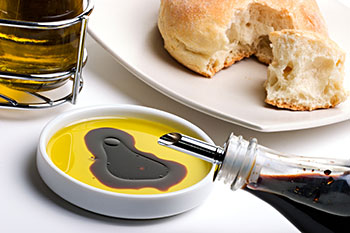It's easy to get answers about health and nutrition! Just send your question by email to [email protected] and Dr. Harlan will respond to selected questions of general interest. Answers will be posted in the Ask Dr. Gourmet newsletter (sign up now!) and archived in the Ask Dr. Gourmet section of the website.
Please note that the Ask Dr. Gourmet feature is restricted to questions regarding food and nutrition. Due to the many questions we receive, not all questions may be answered. For more specific questions about your individual health, please contact your doctor. About Timothy S. Harlan, MD, FACP, CCMS | Terms of Use | Privacy Policy
Ask Dr. Gourmet
What is the alcohol content of vinegar? What should I use instead?
My guy has been sober for sixteen years and prefers that there is no alcohol in the foods that I make. I do use extracts but never heavily. I have avoided the wine/champagne vinegars, but I wonder about balsamic vinegar and the alcohol content.
I would love to know what to use to make up for the lack of wine vinegar. Some recipes I feel I can interchange, but I really wonder about something like gazpacho, where the flavor is really needed.
Dr. Gourmet Says...

Vinegar is created by converting ethanol (the alcohol that we drink) to acetic acid. As such, there are traces of alcohol in vinegar but a very small amount.
Wine vinegars, such as red or white wine and balsamic vinegar, do start with a dilute wine which is then fermented. Instead of the bacteria fermenting sugars, as happens when the wine is made, bacteria from the acetobacter family use the alcohol (ethanol) in the fermentation process. Most of the alcohol is used up, and much like the extracts you are using, there may be traces of the ethanol remaining. It's not likely to be very much - on the order of between 0.1% and 2%. Consequently, using a tablespoon of white wine vinegar might contain a drop of ethanol.
If you or your guy are concerned and feel that you want to avoid white wine or other vinegars, substituting with another acid might work well in your recipes. Lemon juice or lime juice could be a good choice (the lime juice would be especially good with the gazpacho). If you want a softer citrus note, using Meyer lemons, a bit of grapefruit juice, some pickle juice, or even the brine from capers can be a good choices.
Thanks for writing.
Timothy S. Harlan, MD, FACP, CCMS
Dr. Gourmet
More Questions About Balsamic Vinegar
What is the percentage of alcohol in Balsamic Wine Vinegar?
Does balsamic vinegar contain lead?
Is there a rating system for balsamic vinegar?
How long can I keep balsamic vinegar?
Read All Questions About Foods
